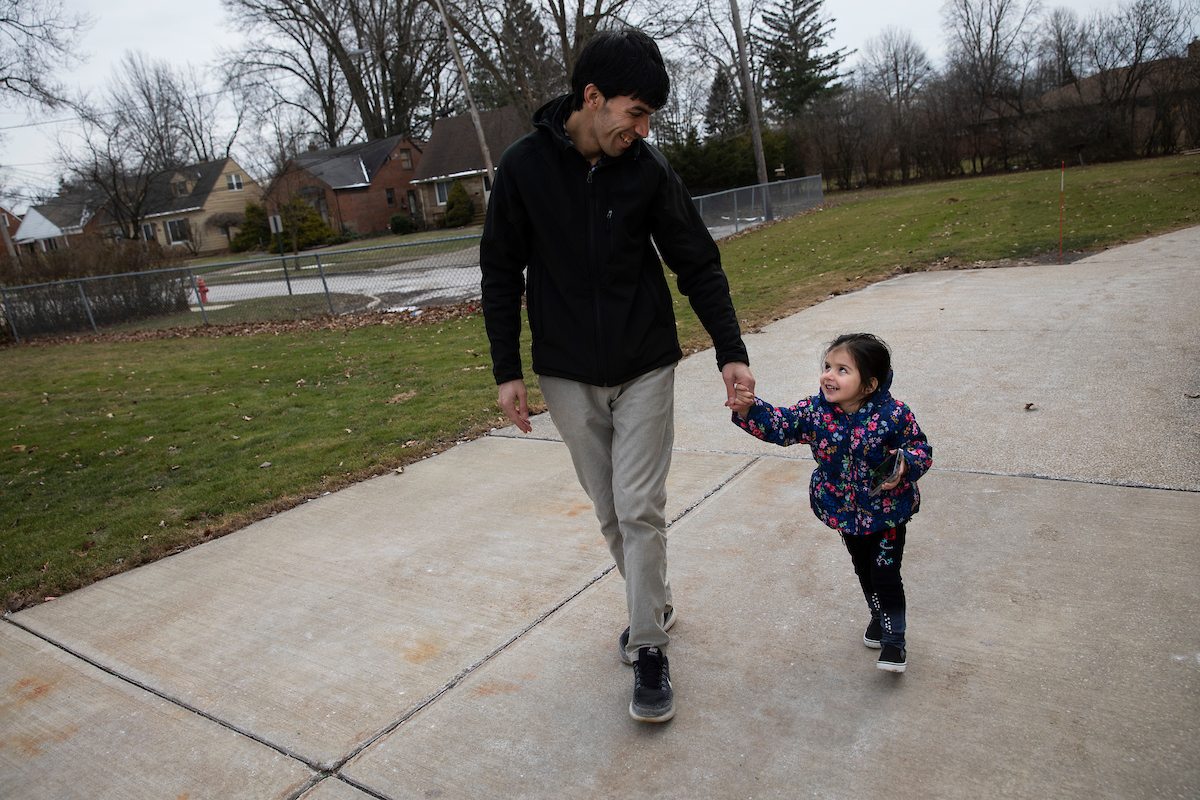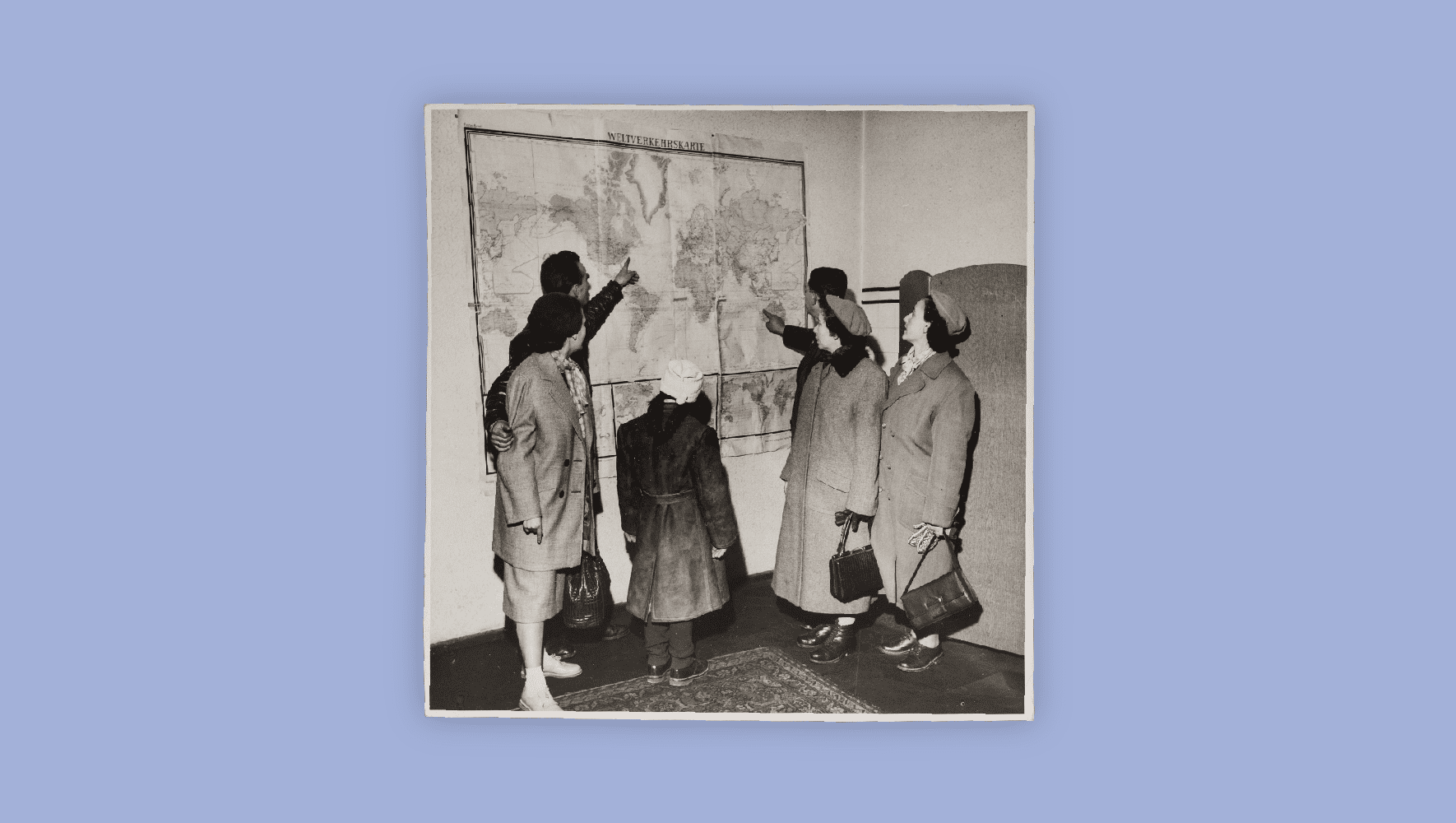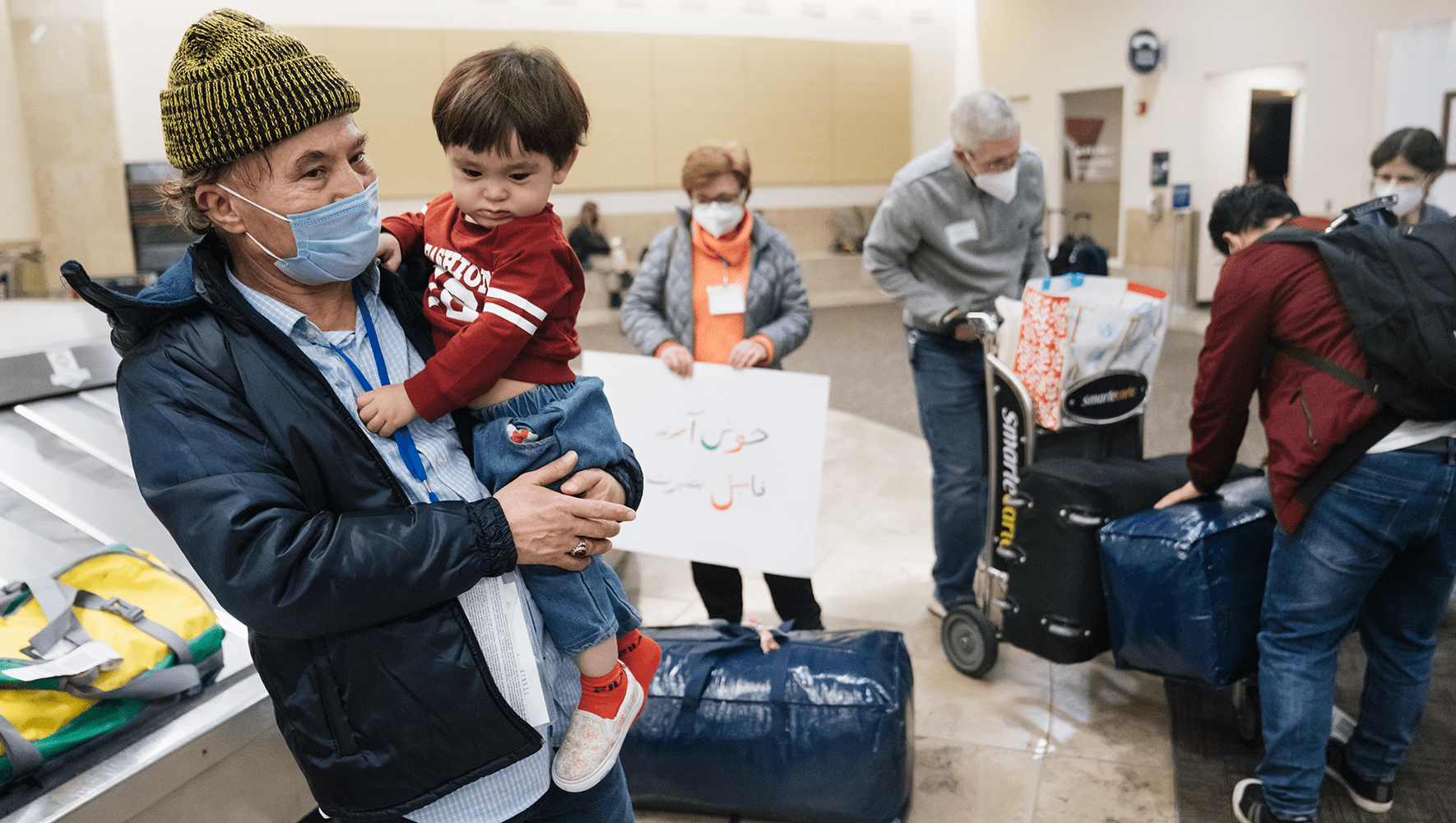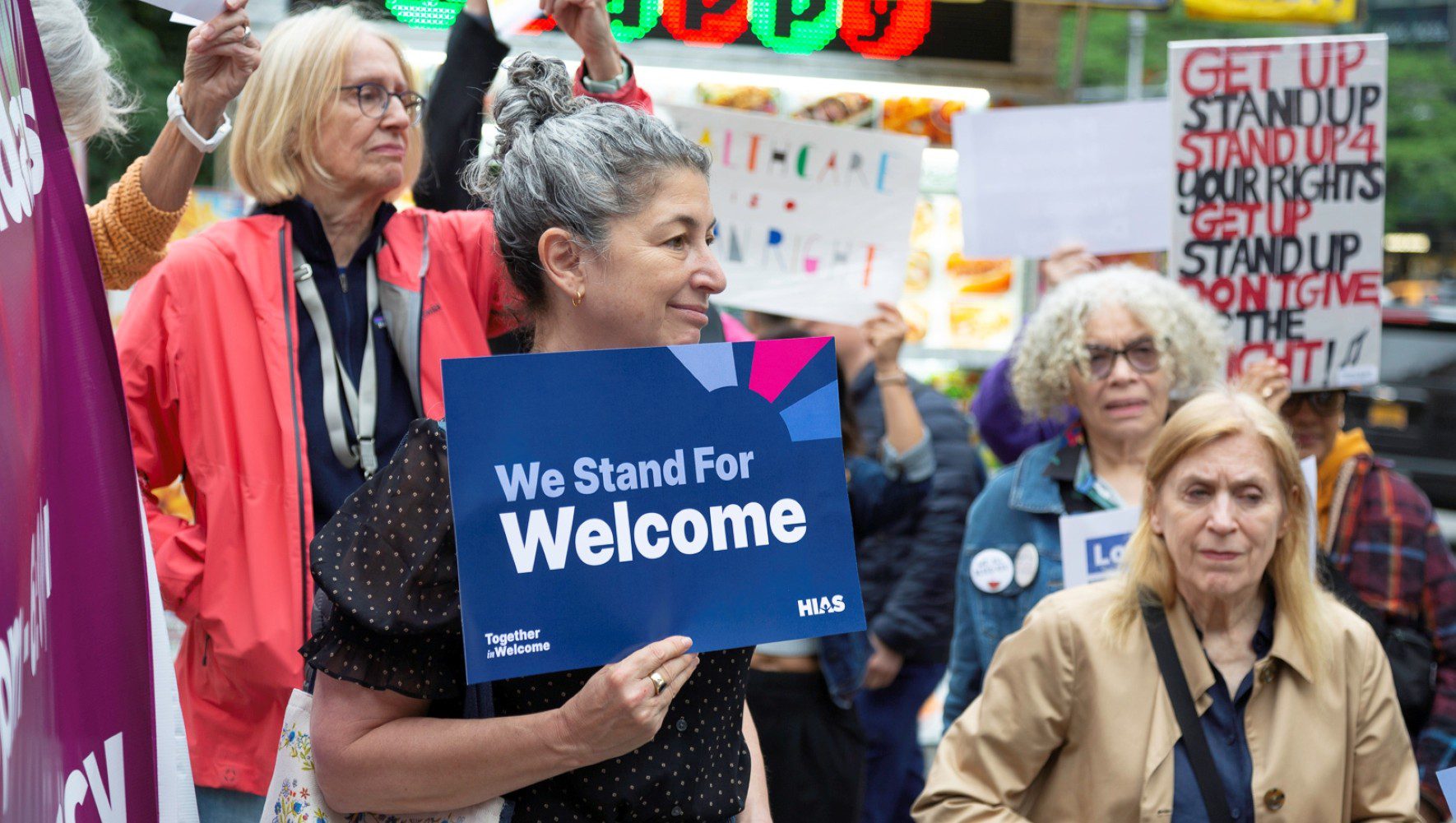From Parwan Province to Ohio, Blazing a Trail
By Dan Friedman
Feb 10, 2022

Waisuddin walks with his daughter Talwasa in Cleveland, OH on January 16, 2022. Waisuddin and his family recently moved to Cleveland from Afghanistan.
(Maddie McGarvey for HIAS)
The late ‘90s sitcom “The Drew Carey Show” was filmed in the comedian’s hometown, each episode opening with the upbeat anthem “Cleveland Rocks.” With pride, the sitcom tapped into the city’s broad seam of self-deprecating humor. It was clear that locals loved their town and, while happy to laugh at it themselves, would defend it against any critic.
Fierce hometown pride also takes the form of hospitality and welcome. In 2021, Cleveland — indeed all of Ohio — welcomed the highest number of refugees in years, with the HIAS affiliate, US Together, alongside other resettlement agencies, at the forefront of that welcome.
Waisuddin had never heard of Drew Carey and didn’t know much about Cleveland when he arrived with his family in the Forest City on August 12, 2021, but from working on various initiatives in Afghanistan during America’s time in the country, he knew of many other friendly buzz-cut marines who hailed from Ohio. And he knew a Turkish colleague on Cleveland’s East Side who had agreed to act as his “local tie” and help him get started in the United States.
His Turkish friend was able to assist the family out when they first arrived, helping with general arrangements, groceries and what Waisuddin calls “basic stuff.” Most of the work of resettlement, though, was done by US Together, HIAS’ Ohio affiliate which runs over 30 programs to resettle, support and integrate new Americans in Cleveland, Columbus, and Toledo. When Waisuddin arrived with his wife and two daughters under the age of three in Cleveland, it fell to Fasihullah Sadat, their US Together case officer, to find them an immediate and a permanent place to stay.
Sadat remembers picking them up from the airport. “He was surprised that his case manager was an Afghan, because he didn't know there were any Afghans here in Cleveland at all…He hadn't had any trouble understanding me explaining new life here in the USA. Wais listened very quietly and carefully and followed our directions. Although COVID made things hard, we were able to put them into a hotel and then, after a short delay, find them a suitable permanent apartment.”
In Afghanistan, Waisuddin had worked on projects that would make him and his family eligible for a Special Immigrant Visa (SIV). Waisuddin and his family arrived in the United States on their fully documented SIV just weeks before the Taliban took the capital, leading the U.S. Embassy to destroy masses of SIV documentation and forcing emergency evacuations. They were lucky to get out, fully documented, before this disastrous blow to people in their situation, just a few weeks behind them.
Finding Waisuddin and his young family a new life was going to be an early test of US Together’s abilities during a pandemic and after the Trump administration’s anti-refugee policies. But Waisuddin was well placed in some ways too. He was used to working with Americans and familiar with American culture, and although English is his fourth language — after Pashto, Dari and Turkish — Waisuddin is perfectly fluent. This has helped him blaze a trail that new Afghan Americans can follow.
Arriving in Cleveland, Waisuddin and his family faced many challenges common to any family moving countries: they had no community support, they had scant financial resources and, though Waisuddin speaks English, his wife spoke none. But they are optimists; though they arrived at Ohio’s hottest time of year, Waisuddin told me that “I love the summer of Cleveland; it is green all around and no heat waves.” With the help of US Together, they put together a new support system, finding a permanent home by mid-September and a new job by mid-October.
Early on, Waisuddin realized that navigating Cleveland would be a lot easier if he had a driver’s license and a car of his own. He was too dependent on the help of Sadat or paying for an Uber for any small errand. So, he put his mind to it and, by September 20 he had a driver’s license. Sadat, his case worker, recalls, “I still remember how happy he was when he got his permit and then his driving license.” Barely six weeks after arriving in America, in a cheap, used car bought with the sum of his savings, Waisuddin was proudly able to “[drive] my family and myself from the hotel to this apartment.”
After getting a car, and settling into his new home and community, Waisuddin was ready to work and support his family financially. With the help of The Refugee Response, one of US Together’s community partners, Waisuddin interviewed as a line-worker at Great Lakes Cheese. The employee- and family-owned company — with thousands of employees across the country supplying a quarter of America’s packaged cheese — offered him a job below his level of competence but he knew that he had to get a foot in the door somewhere, in a competitive work environment.
From the very start, Waisuddin had hopes of using his skills to move up in the company. After meeting him and hearing more about his background and skill sets, GLC decided they wanted to hire Waisuddin in the Human Resources department working on Organization and Talent Development, a role that was in line with his level of education and experience. He began working there full-time on October 18, a little over two months after first arriving in the United States with his family.
While Waisuddin admits that linguistic and cultural barriers have made it difficult for his wife and children to adjust to their new lives in America, he believes that over time they will thrive in their new community. Already, after a few months in the country, the girls are learning their new language.
“Right now, my older daughter Talwasa knows words in English that she doesn’t know in her mother language. She says “One, two, three, four,” which she doesn’t know in any other language, she says “apple,” she says “orange,” she says “banana,” but she doesn’t know this in her mother language. She loves it when I come home and she’s watching something and says “look, look”, which she doesn’t know in her mother language.”
In the meantime, Waisuddin is impressed by the local diversity, “Cleveland makes me feel comfortable. I have met people of different color, religion, ethnicity, background, and culture during my time in Cleveland.” He and his family have been welcomed especially by Cleveland’s Turkish community. There are five Turkish families currently living in his apartment building, and they regularly invite the family to dinner and check in to see what they need, which has been a huge support for Waisuddin and his family.
Ron Hedrick, the Cleveland Site Director for US Together explained how Waisuddin and his family are trailblazers.
“Waisuddin and his family were resettled here in Cleveland right as US Together began to experience a drastic increase in Afghan arrival numbers as a part of the nationwide resettlement initiative. Although increasing capacity and rebuilding local resettlement networks has continued to be an ongoing challenge throughout this process, US Together in Cleveland has already worked to resettle over 160 individuals from Afghanistan.”
HIAS affiliates around the country continue to work on the initiative — including the other two cities that US Together serves. Hedrick noted that they are “ready to resettle more over the coming months. As well as other refugee and immigrants in humanitarian need – whether here in Cleveland or in the other US Together offices in Columbus and Toledo.”
Waisuddin has now enjoyed three of Cleveland’s four seasons — “The snowstorms and inches of snow fall is something new for me. It snows where I used to live, but not this much!” — and is looking to the future.
“The recent influx of Afghan families to Cleveland makes the Afghan community in Cleveland bigger and bigger. I visited a few of my fellow Afghans in Cleveland and we discussed forming a connected Afghan community in the city. We look forward to setting up a community center where we celebrate our cultural events as well as teach our culture to our children as they grow up as Clevelanders.”
Drew would surely be proud!



